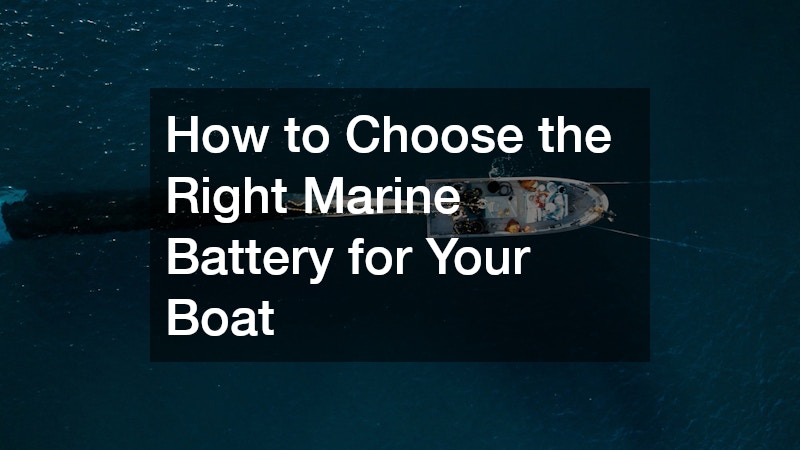
Selecting the correct marine battery is a crucial decision for every boat owner. This choice not only impacts the performance and reliability of your boat but also your safety and comfort during a sail. With the multitude of options available, making an informed decision can be quite challenging. This article delves into the considerations you should make when choosing a marine battery, ensuring you embark on every journey with confidence.
Marine batteries are essential components of any boat, powering everything from the engine to the lights. The most commonly used types include Starting, Deep Cycle, and Dual-Purpose batteries, each serving different needs.
Video Source
A Starting battery is designed to deliver a powerful burst of energy to crank the engine, similar to a car battery. On the other hand, a Deep Cycle battery is engineered to provide steady power over extended periods, suitable for running appliances and electronics on the boat. Dual-purpose batteries, as the name suggests, offer a compromise between starting power and deep cycling capabilities, making them versatile for varied marine uses.
When deciding on a marine battery, understanding these types is the first step. Starting batteries are typically chosen for boats with healthy alternator capacities, where the engine is the primary focus. Deep-cycle batteries are ideal for sailboats and other vessels that operate on auxiliary power systems. While Dual-Purpose batteries can be convenient, they may not excel as highly in one capability as a solely dedicated battery could. Knowledge of these functionalities is key in matching your battery choice to your specific boating needs.
It is also essential to consider the battery's construction and technology. Traditional Lead-Acid batteries are popular for their affordability and reliability. However, AGM (Absorbent Glass Mat) and Lithium-Ion batteries offer distinct advantages such as improved efficiency, longer lifespan, and faster recharging times. For boat owners prioritizing performance, AGM and Lithium-Ion represent premium choices despite their higher cost. Understanding these technologies allows for a more tailored and efficient purchase, often translating into long-term savings and reliability.
The selection of a marine battery should be driven by several key considerations, including battery capacity, compatibility, and maintenance requirements. First and foremost is the capacity of the battery, measured in amp-hours (Ah). Capacity dictates how long a battery can power devices before needing a recharge, crucial for trips where recharging facilities are limited. Selecting a battery with appropriate capacity ensures you have power throughout your journey, minimizing interruptions. Be sure to calculate the total energy usage of your boat's electronics to choose a battery that supports your power demands.
Another important factor is battery compatibility. Not all batteries fit universally, with sizes, terminal configurations, and mounting orientations varying by model and manufacturer. Before purchasing a battery, check your boat’s manual for any specifications. Consider the battery’s physical dimensions and how they fit into your boat’s battery compartment. Always ensure that the battery you choose complements your boat's existing systems to avoid any operational inefficiencies or electrical issues.
The maintenance and overall upkeep of marine batteries play a critical role in longevity and performance. Lead-Acid batteries, particularly flooded types, may require regular checking of water levels and cleaning of corrosion. AGM and Lithium-Ion batteries, however, are designed to be low maintenance, offering a more hands-free experience. Investing time in understanding these aspects can not only prolong your battery’s lifespan but also enhance its reliability. Ultimately, the goal should be to align your maintenance capabilities with the upkeep needs of the battery you select.
Extending the life of marine batteries involves several preventive maintenance practices. One of the most vital is proper charging; maintaining a charge between uses prevents sulfation and degradation. It is recommended to use a smart charger that regulates the current to avert overcharging or undercharging. Regularly inspect battery terminals for corrosion, as it can impede energy flow and damage the battery over time. Cleaning terminals with a mixture of baking soda and water can help maintain optimal conductivity.
Additionally, storing your marine battery properly during the off-season is crucial. Batteries should be stored in a dry and cool place, away from direct sunlight, to prevent temperature-related issues. Before storing, ensure that the battery is fully charged and disconnected from the terminals. It is also advisable to occasionally check and recharge the battery in a storage state to keep it functional. These practices contribute significantly towards sustaining battery health, ultimately ensuring readiness for the boating season.
Finally, understanding your battery's life cycle is crucial. Knowing the expected lifespan based on the type, use frequency, and maintenance history helps in planning replacements timely manner. Most Lead-Acid batteries last for about three to five years under moderate conditions, whereas AGM and Lithium-Ion batteries often extend beyond that range. Keeping guided records of performance and service intervals can provide insights into performance dips that signal replacement needs. Adopting these best practices enables you not only to optimize costs over time but also to enhance your boating experience.
Choosing the right marine battery is a comprehensive process involving analysis of needs, understanding of types, and evaluating life-extending practices. By considering the insights shared above, you position yourself to make informed decisions that enhance your boating endeavors. Remember, a reliable battery not only powers your journey but ensures safety and enjoyment along the way. Selecting a marine battery that matches your requirements and maintaining it accordingly maximizes both its lifespan and efficiency. Embark on your future adventures with the assurance that your battery choice supports your every nautical mile.
